Six dead, hundreds injured in Iran's fire festival mishaps
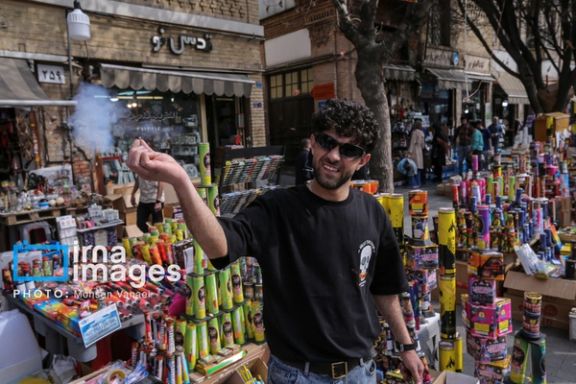
Six people have died and 770 others injured in incidents related to Iran's traditional fire festival since mid-February, the country's emergency services said on Tuesday.

Six people have died and 770 others injured in incidents related to Iran's traditional fire festival since mid-February, the country's emergency services said on Tuesday.
"Since the start of Esfand (February 19), at least 770 people have been injured in these incidents, a 26% increase compared to last year," said Babak Yektaparast, spokesperson for Iran's Emergency Organization, in an interview with state broadcaster IRIB.
He added that 91 people remain hospitalized due to severe injuries, 57 have suffered amputations, 200 sustained eye injuries, and 285 suffered burns.
The Islamic Republic’s crackdown over the years has gradually turned the ancient festival of lighting bonfires before Nowruz, known as Chaharshanbeh Suri, into a night of youth defying authorities.
Despite its evolving nature, the festival remains a deeply rooted cultural event—one that continues to reflect both the resilience of tradition and the defiance of Iran’s youth.

A hacker group called Lab Dookhtegan said it has disrupted the communication networks of 116 ships belonging to two major Iranian shipping companies in one of the biggest attacks against Iranian maritime operations, critical to the country's oil sales.
“In an unprecedented move, we successfully disrupted the communication network of two Iranian companies that, among various terrorist activities, are responsible for supplying munitions to Houthis,” the group wrote on Telegram.
The attack, which the group says was timed to coincide with US military operations against the Iran-backed Yemeni Houthis, severed the ships' connections to each other, their ports, and external communication channels.
“As part of this operation, we targeted the communication network of 116 ships belonging to two major Iranian companies sanctioned by the US Department of the Treasury, the United Kingdom, and the European Union: 50 ships belonging to the National Iranian Tanker Company (NITC) and 66 ships belonging to the Islamic Republic of Iran Shipping Lines (IRISL)."
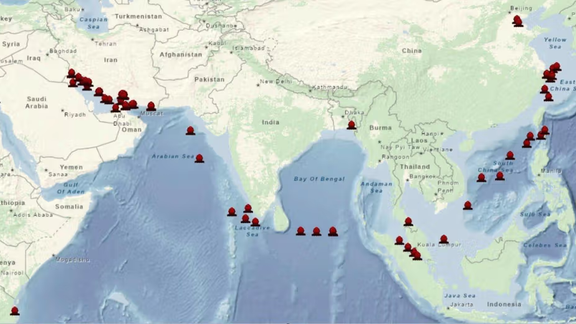
According to the group, these companies facilitate the sale of Iranian oil at reduced prices, with China as a key buyer, while also allegedly supplying munitions to the Houthis in Yemen.
By disrupting ship communications, Lab Dookhtegan says it has significantly hindered operations, adding that full restoration of the affected systems could take weeks. "Ship personnel can no longer communicate with one another, and their connection to the ports and outside world has been severed," the statement read.
There is limited publicly available information on the specific communication systems used by Iranian shipping fleets. However, open-source data and industry analysis suggest that Iranian commercial and military vessels employ a combination of satellite, radio, and encrypted digital networks.
Some reports indicate that NITC's fleet relies on VSAT (Very Small Aperture Terminal) satellite technology for offshore coordination. The attack's success suggests that vulnerabilities may exist in these systems, despite previous efforts to safeguard them.
Lab Dookhtegan, known for previous cyber activities against Iran’s military and intelligence operations, framed the attack as part of a broader strategy to weaken Iranian-backed forces in the region.
Iranian authorities have yet to comment on the attack. In past incidents, state media and officials have either denied cyber intrusions or attributed them to foreign intelligence services. If confirmed, this latest operation would mark one of the most significant cyber disruptions targeting Iran’s maritime sector.
With global attention focused on Iran's regional activities and US military strikes against the Houthis, the implications of the attack extend beyond immediate logistical disruptions. If sustained, communication failures could affect oil exports, insurance risks, and maritime security assessments for Iranian-flagged vessels navigating international waters.
The full extent of the damage remains unclear, but Lab Dookhtegan has indicated that this is only the "tip of the iceberg," suggesting that further operations may follow.
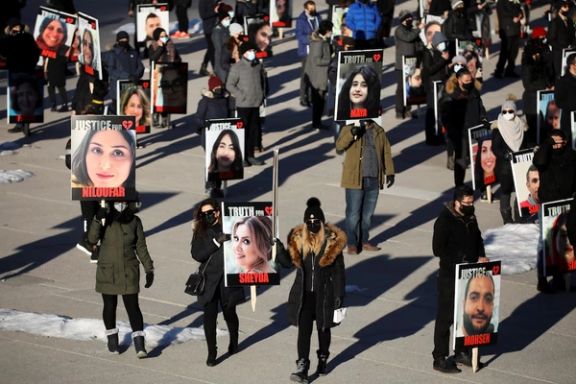
The International Civil Aviation Organization (ICAO) has rejected Iran's objection to a lawsuit filed by four nations over the 2020 downing of Ukraine Flight PS752, bringing them a step closer to holding Tehran accountable, officials said Monday.
"Today, on 17 March 2025, the Council of the International Civil Aviation Organization (ICAO) rejected Iran’s preliminary objection in the case of Flight PS752," a UK Government spokesperson said.
"This decision takes us a step closer to holding Iran to account for its illegal downing of Flight PS752 in January 2020."
The ICAO Council's decision allows Canada, Sweden, Ukraine, and the United Kingdom to proceed to the next phase of their case against Iran, which alleges the downing of the civilian airliner was unlawful.
Ukrainian Foreign Minister Andrii Sybiha confirmed the ruling on X, saying, "Iran attempted to challenge the jurisdiction of the ICAO Council regarding the complaint over the downing of the civilian airliner. But the Council ruled in favor of Ukraine, Canada, Sweden, and the UK and moving the case to the merits."
The Boeing 737-800 NG, operating flight PS752 from Tehran to Kyiv, was shot down by Iran's Islamic Revolutionary Guard Corps (IRGC) shortly after takeoff on January 8, 2020, killing all 176 passengers and crew. Iran initially denied responsibility but later admitted its air defense operator mistakenly identified the plane as a hostile target.
The ICAO ruling comes after years of legal battles and demands for accountability from the families of the victims. "We remain committed to seeking justice, transparency, and accountability for the 176 innocent victims and their families," the UK government spokesperson said.
The Association of Families of Flight PS752 Victims welcomed the decision, saying, "Now, with this condemnation, it is clear to all how little credibility this regime and its deceptive statements hold in the international community."
The four countries initiated a dispute review at ICAO in January 2024, alleging Iran violated the Chicago Convention, which guarantees the safety of civilian flights. They have also filed a complaint with the International Court of Justice (ICJ).
Iran's Foreign Ministry criticized the legal actions as hasty and unjustified, maintaining the downing of the plane was not intentional or deliberate. Ali Mousavi, the ministry’s director-general of legal affairs, urged the four countries to reconsider their stance.
Families of the victims have also pursued legal action within Iran, but have criticized the process for lacking transparency. Lawyer Mahmoud Alizadeh Tabatabai, representing several families, said they were denied access to key evidence.
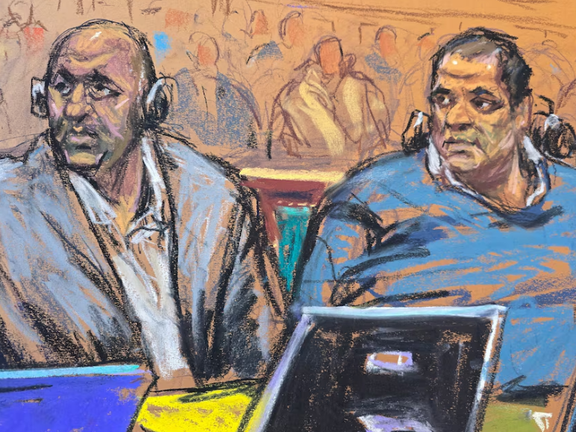
The testimony of an FBI agent Monday in Manhattan Federal court reveals Iran’s ties with the mobsters who they allegedly hired to kill dissident Iranian American journalist Masih Alinejad.
Supervising special agent Justin Tuerack, who oversees the Iran squad at the bureau, took to the stand Monday, detailing the investigation into digital communications of the suspects.
Tuerack said he analyzed the meta data and IP addresses belonging to the cloud, Whats App, Apple IDs and Google Accounts of defendants Rafat Amirov, Polad Omarov and Islamic Revolutionary Guard Corps (IRGC) Ruhollah Bazghandi and members of his Iran-based network - Haj Taher, Hossein Sedighi and Seyed Mohammad Forouzan.
Federal prosecutors said Bazghandi orchestrated the alleged 2022 plot to kill the journalist in Brooklyn. Bazghandi, the brigadier general in the IRGC was previously chief of the Revolutionary Guard's counterintelligence department.
Orders from Iran to assassinate Alinejad
Khaled Mehdiyev, who pleaded guilty to attempting to assassinate Alinejad, testified that he received direct orders from fellow mobsters Amirov and Omarov. These men were acting on instructions from a network led by Bazghandi, according to prosecutors.
Mehdiyev, the would-be assassin, admitted in court that he had been stalking Alinejad outside her Brooklyn home in 2022 with one objective: “Shoot the journalist, kill the journalist.”
The prosecution claims that the Iranian government paid Amirov and Omarov $500,000 to orchestrate the assassination in retaliation for Alinejad’s human rights activism.
The plot was thwarted on July 28, 2022 when police arrested Mehdiyev of Yonkers, New York, as he passed a stop sign driving away from Alinejad’s house.
Digital evidence
Now web searches, text messages, calls and images stored on the cloud of the suspects is revealing the web of connections between the mobsters and Iran.
FBI-submitted evidence included WhatsApp messages from accounts allegedly belonging to Omarov and Amirov. These texts documented their communications with Mehdiyev, Bazghandi, and the IRGC network regarding the assassination attempt.
On July 23, 2022, Omarov sent a chilling message to Amirov: "we blocked it from both sides, it will be a show once she/he steps out of the house," according to FBI metadata evidence submitted in court.
Amirov's IP address showed him as being located in Iran's Western province of Azerbaijan, according to Tuerack at the time. “God willing we will have good news." he wrote back to Omarov.
A few days later on July 27, 2022 Omarov texted Amirov that Mehdiyev's hit on Alinejad would be his birthday gift, which is July 30 according to Omarov's passport.
"I told him to make this a birthday present for me," Omarov text message read said the FBI.
The conversation between the two would-be assassins reflects Mehdiyev's arrest. arrested.
“The fat one did not get in touch” Amirov texted Omarov in early August, apparently referring to Mahdiyev. "Damn him. I don’t want him to cause trouble,” Omarov texted back.
Rafat the Thief
After Mehdiyev’s arrest in July 2022, google searches from the IRGC network show the men searching “Rafat the Thief”, testified Tuerack.
Notably, this search occurred before any public knowledge of Amirov’s alleged involvement in the plot, a detail federal prosecutors emphasized.
Google map searches of Alinejad home, the pharmacy she used, photos and google searches of her husband Kambiz Foroohar were also made from the accounts affiliated with the IRGC network.
On September 5, 2022, a member of Bazghandi team, Sadighi, sent fellow member Haj Taher a message allegedly addressed to yet another alleged member of their network named Forouzan: "this is addressed to you, your boss and the mafia."
There were youtube searches "who wants to kidnap Masih Alinejad" coming from their work, said the FBI.
Forouzan,, according to Tuerack had three entries to describe a phone number allegedly belonging to Amirov: brotherhood, Rome and Rome/Rafat.
From Sept 14, 2022 - to Nov 27, 2022 - Forouzan allegedly contacted Amirov over text 362 times and made 226 calls to each other.
The Bazghandi Network continued to collect information on Alinejad until at least May 2023. The FBI thwarted two plots prior to the attempt to kill Alinejad, one in 2020 and the other in 2021, also by Iranian state agents trying to kidnap the journalist and take her to Iran.
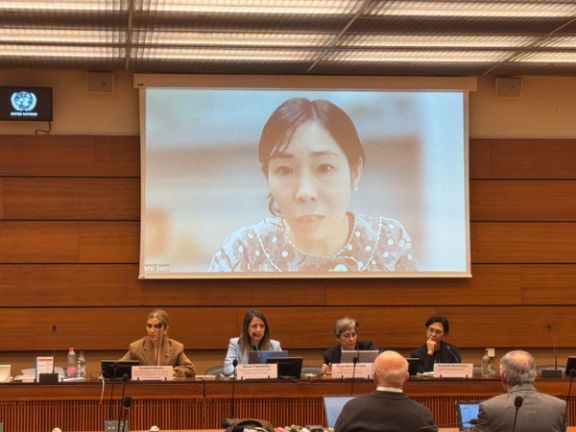
Iranian civil society organizations convened in Geneva on Monday to present evidence of human rights violations in Iran with a focus on the persecution of Baha’is.
The session, held during the UN Human Rights Council meeting, included discussions on minority rights, state repression, and accountability.
A panel hosted by the Baha’i International Community, the Abdorrahman Boroumand Center, and the Impact Iran coalition examined the systematic targeting of Baha’is. The event featured Mai Sato, the UN Special Rapporteur on Human Rights in Iran, alongside prominent rights advocates.
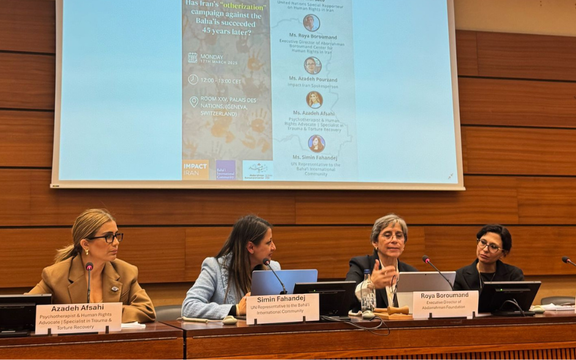
"The interviews with 56 Baha'is with direct experience of persecution offer powerful firsthand accounts that cannot be ignored," Sato said. "The report argues that the Baha'i people of Iran have long been subjected to a systematic process of othering by the state."
The 1979 constitution of the Islamic Republic recognizes only Islam, Christianity, Judaism and Zoroastrianism. Supreme Leader Ali Khamenei has on several occasions called the Baha'i faith a cult and in a religious fatwa in 2018 forbade contact, including business dealings, with followers of the faith.
Baha'is, who number around 300,000 in Iran, say their rights are systematically violated and they are often harassed, forced to leave their homes and businesses, and are deprived of government jobs and university education.
"Bahai women face intersectional discrimination, persecuted both as women and as a member of a religious minority," Sato said. She cited reports of ten Baha’i women in Isfahan being sentenced to a combined 90 years in prison and stripped of assets.
Speaking at the event, Roya Boroumand, director of the Abdorrahman Boroumand Foundation, addressed broader societal changes.
"The Iranians are secularizing, their distancing themselves from Islam, from religion altogether, or they are converting to Zoroastrianism or Baha’ism or Christianity," she said. "For the theocracy, losing its Muslims is a disaster."
The day concluded with a screening of a documentary presented by rights group Justice for Iran, highlighting the courage of protesters and whistleblowers who exposed atrocities during the November 2019 protests.
It heard testimonies from witnesses, victims, and experts on the Iranian government’s violent crackdown, which resulted in the deaths of at least 1500 protestors and mass arrests.
Azadeh Afsahi, a psychotherapist and human rights advocate, spoke about the dangers of dehumanization. "During the Rwanda genocide, Tutsis were called cockroaches. Under Nazi Germany, Jews were called rats. It happened before and it's happening now," she said. "The Islamic Republic of Iran has used otherization to drive its agenda of violence."
As international attention remains on Iran’s human rights record, rights groups continue to document abuses and call for accountability. "Despite these challenges, the Baha'i community demonstrates remarkable resilience," Sato said.

US President Donald Trump warned Iran on Monday that it will be punished if its Yemeni allies the Houthis retaliate against a US air assault over the weekend, escalating his rhetoric against Tehran.
"Every shot fired by the Houthis will be looked upon, from this point forward, as being a shot fired from the weapons and leadership of IRAN, and IRAN will be held responsible, and suffer the consequences, and those consequences will be dire!" Trump wrote on his Truth Social platform.
Trump on Saturday ordered large-scale military strikes against dozens of targets in Yemen controlled by Tehran-backed Houthi armed group, saying the attacks aimed at ensuring freedom of navigation through shipping lanes the militants have targeted.
Fresh US air strikes hit Yemen on Monday, the Houthis' Al Masirah TV reported. The Houthi-run health ministry said on Sunday that at least 53 people were killed in the attacks.
At a Pentagon press conference on Monday, lieutenant general Alexus Grynkewich told reporters that military casualties among the Houthis were in the dozens but there were no indications of civilian casualties.
Shortly after Israel's incursion into Gaza triggered by a Hamas attack on Oct. 7, 2023, the Shi'ite militant group which seized control of much of Yemen started missile and drone strikes against commercial and military vessels in the Red and Arabian Seas.
They described the effort as a blockade in solidarity with the Palestinian people.
Iran and the Houthis have denied close military coordination but weapons experts have linked the Yemeni fighters' advanced arsenal of anti-ship and ballistic missiles to Iranian technology.
US forces have been locked in their most intense naval combat since World War II with the Houthis but have yet to constrain the maritime attacks.
"Let nobody be fooled! The hundreds of attacks being made by Houthi, the sinister mobsters and thugs based in Yemen, who are hated by the Yemeni people, all emanate from, and are created by, IRAN," Trump added.
"Any further attack or retaliation by the 'Houthis' will be met with great force, and there is no guarantee that that force will stop there."
As ceasefires have taken hold pausing combat between Israel and its badly bludgeoned Hamas and Hezbollah militant adversaries, the Houthis have become the vanguard of Tehran's network of armed affiliates in the Middle East.
The Trump administration views their continued harassment of commercial shipping as an obstacle to his fight to bring down prices for US consumers and continued but largely ineffectual targeting of US forces as a nuisance.
"Iran has played “the innocent victim” of rogue terrorists from which they’ve lost control, but they haven’t lost control," Trump said.
"They’re dictating every move, giving them the weapons, supplying them with money and highly sophisticated Military equipment, and even, so-called, “Intelligence.”
Trump this month demanded Iran agree new deal over its nuclear program or face military attack - an overture rejected by Iran's Supreme Leader as bullying.
Ayatollah Ali Khamenei warned Washington would come off worst in any confrontation, insisting that Iran had not been weakened by over a year of direct and proxy conflict with Israel.